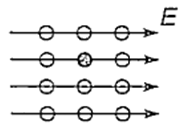 Multiple Choice Questions
Multiple Choice QuestionsWhen deuterium and helium are subjected to an accelerating field simultaneously then
both acquire same energy
deuterium accelerates faster
helium accelerates faster
neither of them is accelerated
Two identical charges repel each other with a force equal to 10 mg wt when they are 0.6 m a part in air (g = 10 ms-2). The value of each charge is
2 mC
2 × 10-7 C
2 nC
2 μC
The potential of the electric field produced by point charge at any point (x, y, z) is given by V =3x2 + 5, where x, y are in metres and V is in volts. The intensity of the electric field at (−2, 1, 0) is
+ 17 Vm-1
− 17 Vm-1
+ 12 Vm-1
− 12 Vm-1
Two identical metal spheres charged with + 12 µF and − 8 μF are kept at certain distance in air. They are brought into contact and then kept at the same distance. The ratio of the magnitudes of electrostatic forces between them before and after contact is
12 : 1
8 : 1
24 : 1
4 : 1
A small conducting sphere of radius r is lying concentrically inside a bigger hollow conducting sphere of radius R. The bigger and smaller spheres are charged with Q and q (Q > q) and are insulated from each other. The potential difference between the spheres will be
An α-particle of mass 6.4 x 10-27 kg and charge 3.2 x 10-19 C is situated in a uniform electnc field of 1.6 x 105 Vm-1. The velocity of the particle at the end of 2 ×10-2 m path when it starts from rest is
8 × 105 ms-1
16 × 105 ms-1
The electric potential at any point x, y,z in metres is given by V = 3x2. The electric field at a point (2, 0, 1) is
12 Vm-1
− 6 Vm-1
6 Vm-1
− 12 Vm-1
D.
− 12 Vm-1
Here, electric potential.
V = 3x2
Electric field,
Two identical conducting balls A and B have positive charges q1 and q2 respectively but q1 ≠ q2. The balls are brought together so that they touch each other and then kept in their original positions. The force between them is
less than that before the balls touched
greater than that before the balls touched
same as that before the balls touched
zero
There is a uniform electric field ofintensity E which is as shown. How many labelled points have the same electric potential as the fully shaded point ?

2
3
8
11
The electric field at a point due to an electric dipole, on an axis inclined at an angle θ (< 90°) to the dipole axis, is perpendicular to the dipole axis, if the angle θ is
tan-1 (2)
